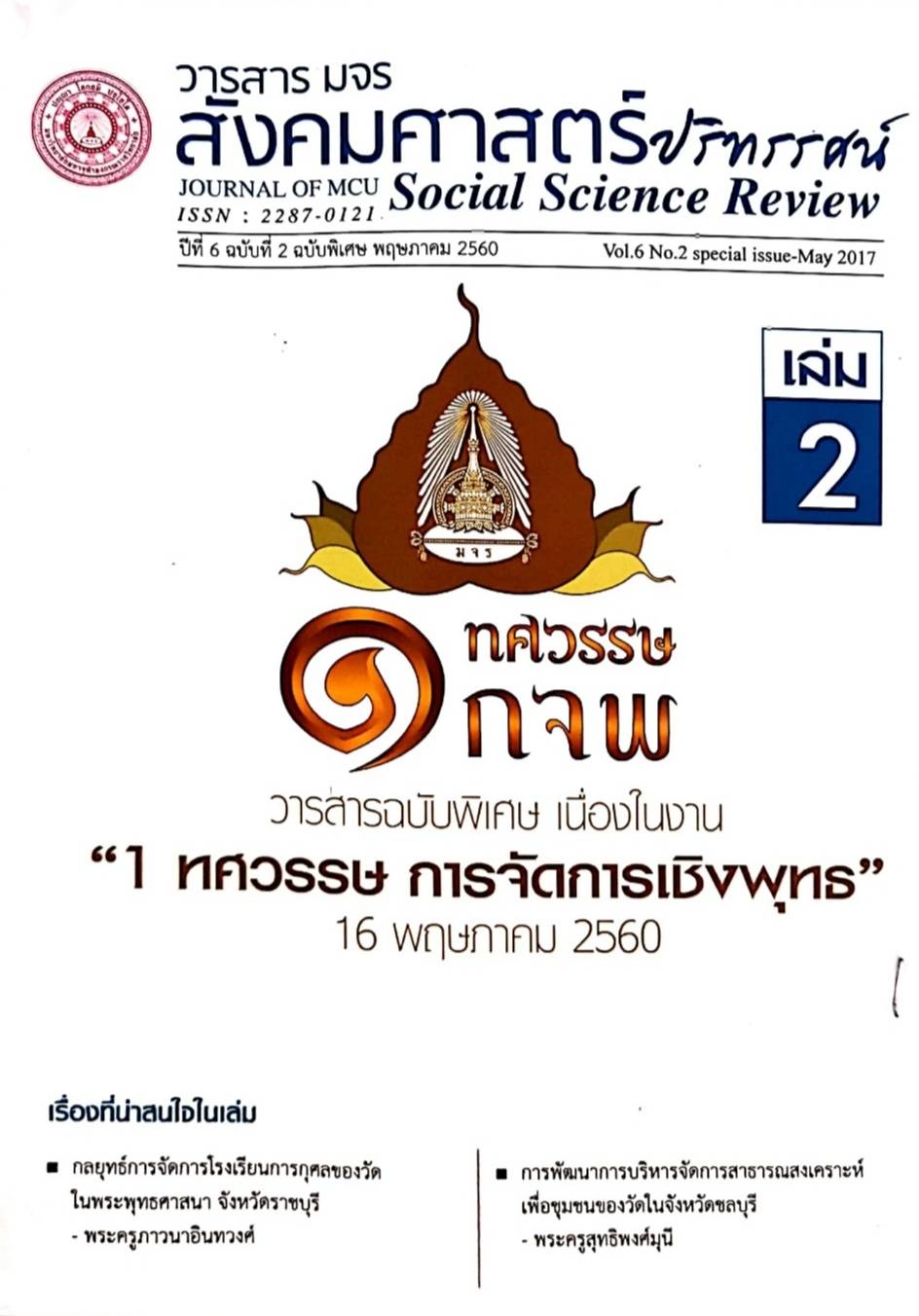องค์กรแห่งนวัตกรรมของวิสาหกิจขนาดกลางและขนาดย่อมสาหรับอุตสาหกรรม ไฟฟ้าและอิเล็กทรอนิกส์ในเขตกรุงเทพมหานครและปริมณฑล
คำสำคัญ:
การมุ่งเน้นความเป็นผู้ประกอบการ การมุ่งเน้นตลาด การมุ่งเน้นการเรียนรู้ องค์กรแห่ง นวัตกรรมบทคัดย่อ
การศึกษาวิจัยนี้มีวัตถุประสงค์ 1) เพื่อศึกษาคุณลักษณะทั่วไปของการมุ่งเน้นความเป็นผู้ประกอบการ การมุ่งเน้นตลาด การมุ่งเน้นการเรียนรู้ และองค์กรแห่งนวัตกรรม 2) เพื่อศึกษารูปแบบขององค์กรแห่งนวัตกรรม กลุ่มตัวอย่างของวิธีวิจัยเชิงคุณภาพ ใช้วิธีการเลือกแบบเจาะจงจากผู้ประกอบการวิสาหกิจขนาดกลางและขนาดย่อมในอุตสาหกรรมไฟฟ้าและอิเล็กทรอนิกส์ที่ได้รับรางวัล SMEs แห่งชาติ ซึ่งตั้งอยู่ในจังหวัดกรุงเทพมหานคร นนทบุรี สมุทรปราการสมุทรสาคร และปทุมธานี กลุ่มตัวอย่างที่ใช้ในการวิจัยเชิงปริมาณ ใช้การเลือกกลุ่มตัวอย่างแบบเจาะจง จากพนักงานของผู้ประกอบการวิสาหกิจขนาดกลางและขนาดย่อมของอุตสาหกรรมไฟฟ้าและอิเล็กทรอนิกส์ ที่ได้รับรางวัลที่ได้รับรางวัล SMEs แห่งชาติ โดยแจกแบบสอบถามไปยังพนักงานจานวน 520 คน ผลการศึกษา พบว่า การมุ่งเน้นความเป็นผู้ประกอบการ การมุ่งเน้นตลาดและการมุ่งเน้นการเรียนรู้ ส่งผลต่อการเป็นองค์กรแห่งนวัตกรรม
เอกสารอ้างอิง
Niti Rattanaprichavej. (2010). Organizational Performance of Small and Medium Enterprises (SMEs) from the Concepts of Learning Organization and Organizational Innovation. Doctor of Public Administration. National Institute of Development Administration.
PAPOPEPON TERMTRIRAKIJ. (2012). FACTORS INFLUENCING PERFORMANCE OF SMALL AND MEDIUM ENTERPRISES: A CASE STUDY OF ELECTRICAL AND ELECTRONIC INDUSTRIES. DOCTOR OF PHILOSOPHY IN PUBLIC ADMINISTRATION. SRIPATUM UNIVERSITY.
Sutheera Atawongsa. (2013). The Effects of Entrepreneurial Orientation and Enterprise Characteristics Toward Thai SMEs’Growth. Doctor of Business Administration Program. Dhurakij Pundit University.
Ali Abdul-Fattah Alshaher (2015). Analysis the Relationship between Strategic Information System Effectiveness and Entrepreneurial Orientation for Some Telecom Firms.
Amie Kusumawardhani and group (2012) Autonomy and innovativeness: Understanding their relationships with the performance of Indonesian SMEs. University of Wollongong.
C. Callaghan & R. Venter (2011). An investigation of the entrepreneurial orientation, context and entrepreneurial performance of inner-city Johannesburg street traders. Southern African Business Review Volume 15 Number 1,
Dae-Yul Jeong and group (2014) Customer Orientation and Organizational Performance: Mediating Role of CRM. Advanced Science and Technology
Fakhrul Anwar Zainol and Selvamalar Ayadurai (2011). Entrepreneurial Orientation and Firm Performance: The Role of Personality Traits in Malay Family Firms in Malaysia. International Journal of Business and Social Science Vol. 2 No. 1.
Hardy Loh Rahim and group (2015) The Effect of Entrepreneurial Leadership towards Organizational Performance. International Academic Research Journal of Business and Technology.
Haryanto A.T and Haryono T. (2015) THE INFLUENCE OF MARKET ORIENTATION ON INNOVATION TYPE AND ENTERPRISE PERFORMANCE. POLISH JOURNAL OF MANAGEMENT STUDIES. Vol.11 No1.
Joanna EJDYS (2015) MARKETing ORIENTATION VS. INNOVATIVENESS OF SMEs OF THE PODLASKIE PROVINCE. Faculty of Management, Bialystok University of Technology, Wiejska Street 2, 15-351 Bialystok, Poland.
Nofal Nur and group (2014). Entrepreneurship Orientation, Market Orientation, Business Strategy, Management Capabilities On Business Performance; Study At Small And Medium Enterprise Printing In Kendari.
Rodney Oudan (2012). Market Orientation -Transforming Trade and Firm Performance. International Journal of Marketing Studies. Vol. 4, No. 2; April 2012. Worcester State University, United States.
ดาวน์โหลด
เผยแพร่แล้ว
รูปแบบการอ้างอิง
ฉบับ
ประเภทบทความ
สัญญาอนุญาต
ลิขสิทธิ์ (c) 2020 วารสาร มจร สังคมศาสตร์ปริทรรศน์

อนุญาตภายใต้เงื่อนไข Creative Commons Attribution-NonCommercial-NoDerivatives 4.0 International License.
เพื่อให้เป็นไปตามกฎหมายลิขสิทธิ์ ผู้นิพนธ์ทุกท่านต้องลงลายมือชื่อในแบบฟอร์มใบมอบลิขสิทธิ์บทความให้แก่วารสารฯ พร้อมกับบทความต้นฉบับที่ได้แก้ไขครั้งสุดท้าย นอกจากนี้ ผู้นิพนธ์ทุกท่านต้องยืนยันว่าบทความต้นฉบับที่ส่งมาตีพิมพ์นั้น ได้ส่งมาตีพิมพ์เฉพาะในวารสาร มจร สังคมศาสตร์ปริทรรศน์ เพียงแห่งเดียวเท่านั้น หากมีการใช้ภาพหรือตารางหรือเนื้อหาอื่นๆ ของผู้นิพนธ์อื่นที่ปรากฏในสิ่งตีพิมพ์อื่นมาแล้ว ผู้นิพนธ์ต้องขออนุญาตเจ้าของลิขสิทธิ์ก่อน พร้อมทั้งแสดงหนังสือที่ได้รับการยินยอมต่อบรรณาธิการ ก่อนที่บทความจะได้รับการตีพิมพ์ หากไม่เป็นไปตามข้อกำหนดเบื้องต้น ทางวารสารจะถอดบทความของท่านออกโดยไม่มีข้อยกเว้นใดๆ ทั้งสิ้น





